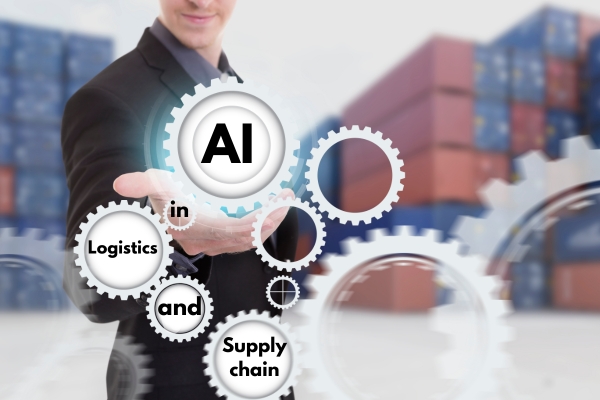The world of logistics and supply chain management is undergoing a transformative revolution, driven by advancements in Artificial Intelligence. As we embrace the future, artificial intelligence is set to play a pivotal role in reshaping the industry, bringing forth a myriad of benefits. From enhanced real-time tracking to accurate market trend prediction and improved warehouse operations, the integration of AI technologies promises to unlock unprecedented growth and efficiency in the logistics and supply chain sector.
Contents
How Can Artificial Intelligence Improve Supply Chain Transparency?
Accurate Market Trend Prediction
Artificial intelligence algorithms have the capacity to analyze vast amounts of data at unprecedented speeds. This capability is harnessed in logistics and supply chain management to predict market trends with remarkable accuracy. By analyzing historical data, consumer behavior, and external factors influencing the market, artificial intelligence can provide valuable insights that help companies make informed decisions about inventory management, demand forecasting, and distribution strategies. This foresight allows businesses to adapt swiftly to changing market dynamics, optimize inventory levels, and ultimately reduce costs.
Enhanced Real-Time Tracking
One of the key contributions of artificial intelligence in logistics is the advancement of real-time tracking capabilities. Traditional tracking systems are often limited in their ability to provide instantaneous and precise information. artificial intelligence changes this landscape by leveraging data analytics and machine learning to offer enhanced real-time tracking. With the integration of sensors, RFID technology, and GPS, artificial intelligence enables logistics companies to monitor shipments in transit with unparalleled accuracy. This not only ensures the safety and security of goods but also allows for proactive decision-making, reducing the risk of delays and improving overall operational efficiency.
Improved Warehouse Operations
Warehousing is a critical component of the supply chain, and artificial intelligence is revolutionizing the way these operations are managed. AI-powered robotics and automation systems are being implemented to streamline warehouse processes, including inventory management, order fulfillment, and picking and packing. These technologies not only enhance the speed and efficiency of operations but also reduce errors and labor costs. AI-driven predictive maintenance further ensures that equipment functions optimally, minimizing downtime and maximizing productivity.
Unlocking Growth and Efficiency
The integration of artificial intelligence in logistics is a catalyst for unlocking unprecedented growth and efficiency. Automation of routine tasks, optimization of routes, and intelligent decision-making contribute to cost savings and resource optimization. With the ability to process and analyze vast datasets, artificial intelligence enables companies to identify inefficiencies, mitigate risks, and capitalize on opportunities for growth. This not only improves the bottom line but also positions businesses to be more agile and responsive in an ever-changing market.
How Global Companies Use AI to Prevent Logistical Disruptions?
Identifying and Qualifying Alternative Suppliers
One of the pivotal applications of artificial intelligence in supply chain management lies in the identification and qualification of alternative suppliers. Global companies harness the power of artificial intelligence algorithms to analyze a myriad of data sources, ranging from supplier performance metrics and geopolitical factors to market trends. By doing so, they can proactively pinpoint alternative suppliers, should disruptions occur with primary sources. This not only adds a layer of resilience by diversifying the supplier base but also mitigates risks associated with over-dependency on a single source.
Technology-Based Solutions for Resilient Automotive Supply Chains
Artificial Intelligence has emerged as a cornerstone in the automotive industry’s efforts to address the challenges posed by its complex supply chains. At the forefront of this transformation, artificial intelligence technologies are instrumental in real-time monitoring of inventory levels, demand fluctuations, and production delays. Moreover, predictive maintenance algorithms powered by artificial intelligence play a crucial role in identifying potential equipment failures before they occur, effectively minimizing downtime and ensuring a seamless production flow. This strategic integration of AI not only enhances operational efficiency but also serves as a proactive measure against supply chain disruptions in the automotive sector.
Unlocking Additional Value from Existing Suppliers
Artificial intelligence goes beyond the search for new suppliers; it also focuses on unlocking the untapped potential within existing supplier relationships. Through sophisticated AI analysis, companies can delve into the capabilities of their current suppliers, identifying hidden resources or additional services that may be leveraged during disruptions. This strategic approach transforms suppliers from mere transactional entities into collaborative partners, fostering a mutually beneficial relationship that adapts to the evolving demands of the market.
Diversifying AI Tool Portfolios for Resilient Supply Chain Management
To tackle the ever-changing challenges within supply chain management, multinational corporations are constructing versatile arrays of artificial intelligence tools. These tools encompass a wide range of applications, such as predictive analytics for forecasting demand, machine learning algorithms for optimizing routes, real-time monitoring systems, and supply chain analytics. Through the integration of diverse artificial intelligence technologies, businesses are laying the foundation for a sturdy and flexible framework that can adeptly address disruptions at various points along the supply chain.
Streamlining Negotiations with Automated AI Systems
Negotiating contracts and agreements has historically been a time-consuming endeavor, especially when considering supply chain challenges. However, artificial intelligence is transforming this facet of supply chain management. Automated negotiation systems, bolstered by AI, can swiftly analyze extensive datasets that include historical information, market dynamics, and metrics related to supplier performance. By automating these tasks, organizations can accelerate negotiations, ensuring both efficiency and the flexibility to address supply chain challenges.
Conclusion
The future of artificial intelligence in logistics and supply chain management holds immense promise. The industry is on the cusp of a technological revolution that will redefine how goods are transported, stored, and delivered. Enhanced real-time tracking, accurate market trend prediction, improved warehouse operations, and the overall unlocking of growth and efficiency are just a glimpse into the transformative power of artificial intelligence. As businesses embrace these advancements, they position themselves not only to survive but to thrive in the dynamic landscape of modern supply chain management.










